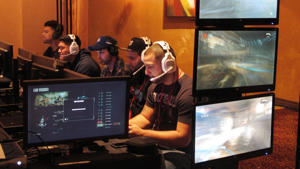
© Wayne Parry / AP Video game players compete against one another in an esports tournament.
In some ways, video games and gambling couldn’t be more different: Success in video games comes down to skill, whereas gambling relies heavily on chance.
But in recent decades, the worlds of gaming and gambling have blurred — as the gambling industry uses smartphones to gamify betting and as video games incorporate randomized loot boxes, slot machines and other forms of gambling, sometimes with real money on the line.
As kids and young adults encounter some form of gambling at younger ages, it’s worth asking: Do video games, at all, contribute to larger gambling issues, or vice-versa?
Part of this has to do with the rapid adoption of legalized gambling within the U.S. Since the Supreme Court struck down a law in June 2018 that mostly prohibited states from authorizing sports betting, 26 states have legalized mobile betting, and 11 more have introduced voter referendums to change the law.
“There’s a ton of action that’s really migrated away from the pervasive and predatory illegal websites and corner bookies and into the protections of the legal market,” said Casey Clark, senior vice president of the American Gaming Association.
“Technology has enabled sports betting to be this 24-hours-a-day, seven-days-a week opportunity, where previously you had to go to a state where this was legal. And now we have it even more broadly. It’s at the end of your hand. How many people leave their smartphones far away from their bodies?” said Brett Abarbanel, director of research at the UNLV International Gaming Institute.
Business is lucrative too: Since the U.S. changed its rules around legal wagers, Americans have placed roughly $200 billion in bets.
Mobile betting is a huge piece of the pie. In New Jersey, the state with the most sports betting outside of Nevada, roughly 80% of all wagers are placed through sportsbook apps or websites.
SEE MORE: Mobile sports bets booming in some states as others shy away
“If we look across the whole U.S., the number one indicator “success” of volume in a sports betting market is the presence of multiple online brands,” said Eric Ramsey, data analyst at PlayUSA. “It is really the number one thing we look at when we’re assessing the health of a market. All of the largest markets in the U.S. have the most robust online products.”
Experts told Scripps News that young men are particularly at risk when it comes to sports betting, in part because of the way that mobile phones have allowed the betting market to more resemble that of playing a video game.
And on the betting side, wagering itself has become much more gamified, as players can place multiple in-game bets as a contest goes on. For instance, a person can bet on things like the number of three-pointers completed by a certain player or how many yards an NFL receiver might get in a game. Between that and having opportunities to bet on non-sporting events, such as e-sports, mobile betting has enabled the activity to be in constant flow.
UP NEXT
“It’s been established in a couple of research papers now that in-play betting is associated with problematic gambling behavior,” Abarbanel said. “There’s always more research that can be done that it’s a cause of problematic gambling, but it’s certainly something where, I mean, if I’m getting alerts on my phone all the time that there’s a new wager, it can be a potential trigger.”
“I think what you find with legal sports betting is that it opens up a lot of different options to a lot of consumers to find this to be a really entertaining way to engage with their favorite sports,” Ramsey said. “And we know that from our research that fans who have a little bit of action on any competition will be much more engaged in the content, so it makes sense why leagues and media companies and teams are really embracing this opportunity because you’re getting many more eyeballs on the competition for a lot longer.”